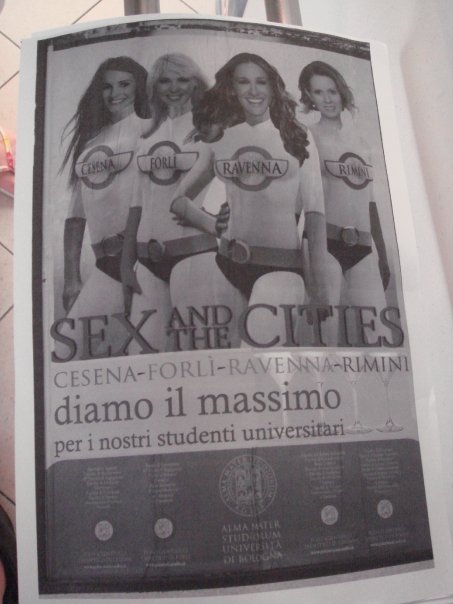For f...'s sake, leave us alone!!
Advertising of any kind, of any commodity is always addressed to those who should get it. In the 1950s and 1960s, male bread-winner families were the target; long-time consumption commodities kept industries going and helped the post-war economic boom to grow undisturbed for a while. Men, mostly, were those being exploited outside the household and earning the income, while women inside were the ones busy working for the daily reproduction of their men's labour power; commodity-marketing thus accomodated the division of labour by asking men to make their women happy but running ... in the end, it was not that difficult to do it ... a blender, a new dishwasher and everything was fine.

Despite its obvious gender bias, an advertisement like the one above looks almost cute and innocent compared to the level of sexism that has been reached nowadays. The latter is true especially in Dwarf-land, brought recently to renewed international attention thanks to its prime minister's regular use of public money to visit prostitutes, to host lolita-like private parties in his villas with promises of short TV appearances and, especially, to spend a one-night-stand with young women looking to start up their own enterprises. Thus, more than anything, the Dwarf Era in Italy has amounted to a dramatic increase of sexism and disrespect for women, which is not only testified by an incredibly widespread soubrette-culture, for which young women's primary aspiration is to become a velina in one of the Dwarf's TV. More than this, the Dwarf's sexist era is progressively marked by a widespread wave of extreme violence, sexual abuses and rapes against women, the nature and role of which are publicly depicted as sexual satisfaction of men appetites. The increasing sexism of the advertising campaigns that can be seen on the walls of the streets are a very eloquent sign of this anti-feminist surge.
"We have the most famous sterns of Italy", is stated in the image on the left, where stern (poppa) in Italian also has the meaning of boob. Thus we see a regiment of young female bums entering the new ferry that promises to sweeten the holidays of all those going from Naples to Catania with a nice stock of young pretty girls.
Female sterns-boobs are used by the same company in the image below, and the advertising strategy does not fail to reassert how sexy it could be to go from Campania to Sicily, which are personified by their respective boobs-volcanos.
Travelling around the country, it is completely normal to run into huge posters - hung up on the most crowded streets of the cities - in which not only women's bodies are used to sell all sorts of commodities, but in which the sexual message becomes increasingly starker.
"Trust me! I will give it to you for free" comes out of the voluptuous woman's mouth in block capitals in the image below ... yet, it is not her sexual services, but the glasses' frame (la montatura) that will be given gratis to the lucky customers - as the undertitle clarifies - though 'montatura', in Italian language, is both the glasses' frame and the sexual position of riding.

It could be thought that what all these double-meaning, schlock-taste advertisements produce is just a smarmy smile on people's face, a bit of arousal to keep up the daily routine. However, instead of innocent excitement, today in Italy there is a daily count of violence and rapes against women. A dramatic growth of male brutality that is certainly not discouraged by an every day platitude that women are nothing but sexual objects waiting for their consumption... even with the brute force. In the image below, for example, a quasi-rape scene is used to promote a new clothes-brand. Yet, the company does not seem to be happy merely to use the image of brutally taking off woman's clothes for this commercial purpose. It aims to do it by also employing the evergreen stereotype of the black raper. The potential rapers, in fact, are blackmen, seemingly police, just to add a fashionable flavour of harsh racism to extreme sexism.

The list of sexist-advertising could go on indefinitely, perhaps even risking to fetishise this miserable southern-European culture as a red-blooded paradise.
Instead of always self-portraying themselves as latin lovers, super-machos and virile horses, Italian men would be better off realising that what the sexy advertising speaks of is their sexual impotence, pathetic insecurity and clumsy incapability of getting laid without a bit of brutality.
It is not by chance that instead of the blender for devoted house-wives, today's marketing strategists sell Italian repressed mummy-boys what they think they cannot easily get for free: thus companies sell them a quick glimpse into the décolleté of a perfect-fake breast, the sexual fantasy of a naked-female-army willing to excite them during terrible trips on rotten non-functioning ferries, the forbidden dream of playing the stereotype of the well-endowed black man trying to abuse a pretty white women.
Fortunately enough, it seems to me that more and more often Italian women (but also many men) are denouncing such barbarism and making it visible in all its shame.
Here is a short list of my Italian girl-friends who fight everyday against sexism and violence. Go, girls, go!















